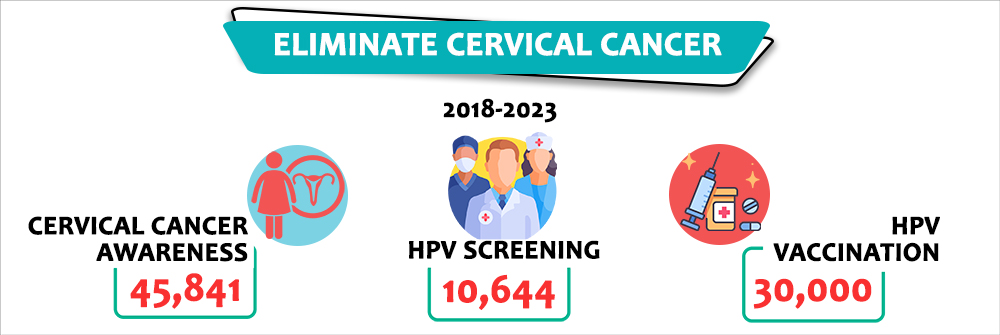Eliminate Cervical Cancer in India

The high incidence of 123,907 new cervical cancers diagnosed annually in Indian women contributes significantly to the global burden of cervical cancers. Cervical Cancers are caused by High Risk Human Papilloma Virus (HR-HPV) and 99.7% are positive for HR-HPV. The good news is that Cervical Cancer is preventable through HPV Vaccination and systematic, organized HPV screening, leading to prevention and early detection resulting in better prognosis and high rate of cure.
CPAA is focused on application of triple strategy for elimination of cervical cancer from India. These comprise:
1. Cervical Cancer awareness:
CPAA holds interactive sessions highlighting the risk factors, modalities of prevention and early detection and signs/symptoms of cervical cancer, and removal of the myths, misconceptions, fear and stigma associated with cervical cancer. Cervical cancer awareness programs were held for camps 30,000 individuals.
2. Early Detection through Screening by HPV testing :
CPAA provides international state-of-the-art Hybrid Capture 2 testing facility and HPV DNA PCR detection for high risk HPVs at the Mumbai Center, and has screened 10,000 women for HR-HPV. We observed 6.8% women with HPV positivity indicating high risk of cervical cancer. The HPV positive women are counselled by the team for risk and early detection of cervical cancer and the forward steps to prevent and control cervical cancer. Initiatives to provide free HPV tests for the socio-economically underprivileged women and subsidized rates for women for screening for cervical cancer promotes awareness and alerts the women to early detection resulting in better prognosis, reduced incidence and down grading cervical cancers.
Cervical Cancer Symptoms:
- Abnormal vaginal bleeding, bleeding between periods, after intercourse or after menopause
- White, brown or blood stained, foul smelling vaginal discharge
- Loss of appetite
- Unexplained weight loss
- Involuntary loss of urine or fecal matter
3. HPV Vaccination: A safe, efficacious vaccine providing protection against cervical cancer
At any given time, about 6.8% of women in India have cervical HPV infection. HPV 16 and 18 account for 70% – 80% cervical cancers in India. Two HPV vaccines are available in India, as Gardasil and Cervarix. These vaccines are prophylactic in nature and should be administered prior to HPV infection. The vaccines are administered in the deltoid muscles. Preferably in the arm.
Characteristics of HPV Vaccines:
- Protection against Cervical Cancer
- Proven efficacy and safety
- 99-100% efficacy against relevant HPV types
- Vaccine injections are given intramuscularly in the deltoid muscle in the upper arm or in the thigh region
- No severe adverse side-effects reported
- Vaccine doses administered: 350 million doses globally and 4,00,000 doses in India
- Contraindicated in pregnant women
- Approved by the Drug Controller of India
CPAA has initiated several free HPV Vaccination Camps for girl students from marginalised socio-economic background in villages of Maharashtra with generous sponsorships from corporate groups. CPAA was invited by Chief Minister’s Health Mission Cell, Mantralaya, Maharashtra, to conduct the HPV vaccination camps in Dindrud, Ahmednagar, in Vairag, Solapur and Ralegaon Siddhi, Ahmednagar (mentored by Social Activist Shri Anna Hazare), Mayor and MLA – Panvel, MLA – Chikhli, Buldanan, MLA – Karad. Two doses of the vaccine were administered to 7,500 school girls. At Ralegaon Siddhi women in the age group 26 – 45 years, the women were also screened for HPV using the Hybrid Capture 2 System. The screenings and vaccinations will result in reducing the incidence of cervical cancers, downgrade the cancer, and better prognosis in cervical cancer in the Indian women.
Support CPAA’s Cervical Cancer HPV Screening Program:
Donate now
Cost per individual test: Rs. 1,650
CPAA’s Cervical Cancer HPV Vaccination Program:
HPV Vaccination
Rs.6,000 (per individual, 9 – 18 years females, Two doses) Rs.9,000 (per individual, 18 – 45 years females, Three doses)
| Recommended Vaccination Schedule | |||
| Age | 9 -18 years | 18 – 45 years | 26 – 45 years |
| Dosage | 2 Doses (at 0 & 6 months) | 3 Doses (at 0, 1 & 6 months) | 3 Doses (at 0, 1 & 6 months) (HPV Screening recommended prior to vaccination of this group) |
(Help us keep you updated of our projects with an email about your generous donation)
